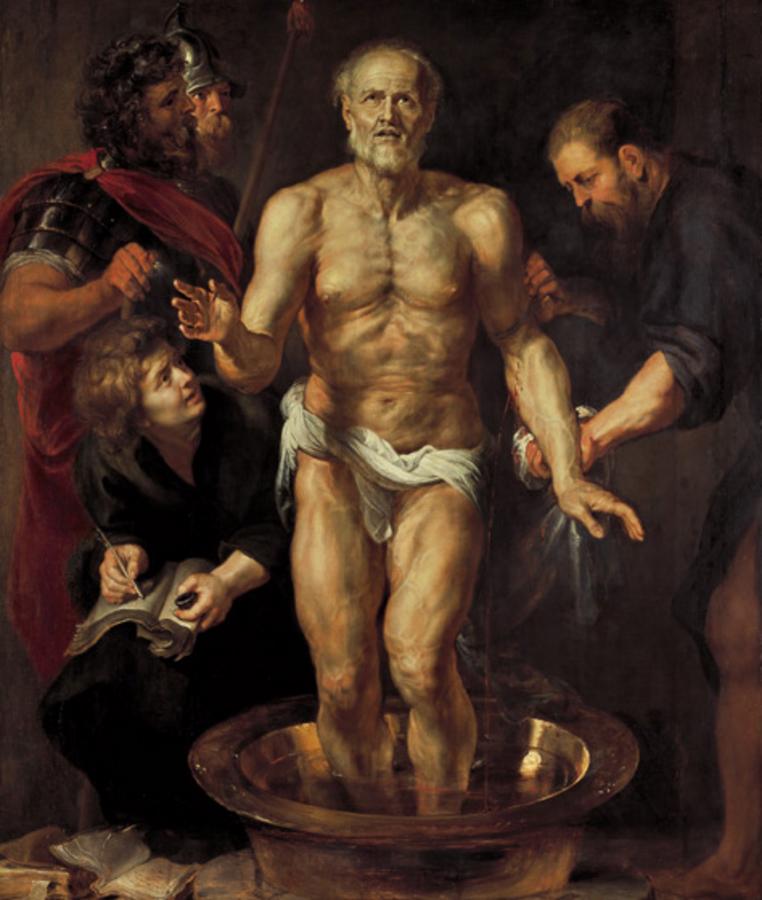
During a recent chat with my good friend Epicurus of Albion, we both agreed that it should be the mission of this website and our goal as human beings to bring stoicism back to its rightful place as a popular discipline of mind to help people everywhere retain their inner peace during challenging life circumstances.
Stoicism is the ultimate life philosophy, it’s ancient, tried and tested and empowering.
The average human being fears loss and pain, a fact that nobody tends to acknowledge in modern life despite the fact that it is pretty much guaranteed to come along at some time or another.
People and in particular the media gloss over the very obvious fact that life is hard, and that tragedy is just around the corner, preferring instead to sell us a fantasy that life is good and that nobody else suffers. This can often make us all feel alone and depressed and it should do, because it’s a lie. The reality is different and incredibly easy to understand with a few stoic principles behind you.
Stoics understand that men are born to suffer. Suffering can come in many forms from poor finances to poor life circumstances such as a poor job or a lack of career not to mention poor health.
Suffering can be fleeting or extended, such as a short illness or a chronic condition It might be punctuated by long or short periods of stability, health and good fortune, yet the stoic would understand that what is good and pleasant in your life today may not be around tomorrow, an unpleasant truth that people in this day and age do not heed or prepare for making them ill equipped to ride out the storms and tempests of life as and when they come.
When bad fortune descends upon us, we tend to treat it like an unwanted houseguest, a terrible surprise, a gift given to us in very bad taste.
“We suffer more often in imagination than in reality”
― Seneca
A stoic would not only welcome the adversity he would triumph over it in the only place where it matters and that’s in the mind.
What is good cannot be relied upon to continue despite your best efforts to maintain it. Life can be capricious, but your true stoic will weather any storm.
This is because he would immediately recognise that most things in life are beyond our control, some things we can control a little, others we may have full control over. The wise man would do well to be indifferent to things beyond his control only applying his efforts to the things that he can influence or control directly.
This indifference is termed stoic apathy (apatheia) and is fundamentally different to the modern usage of apathy which implies a lethargic state of mind. Stoic apatheia is simply the conscious effort not to waste any mental energies on things that we cannot control or will have little bearing on our lives.
For example, a man you know may well have a beautiful car, riches beyond compare and a beautiful wife you should be thankful that you have no need or desire of a beautiful car, a beautiful wife and a fat wallet.
What you do not desire makes you free, it is one less source of mental pain that you do not have to endure.
“It is not the man who has too little, but the man who craves more, that is poor. ”
― Seneca
You have a freedom and peace of mind that your rich friend probably won’t have. Imagine how such a man might feel were he to lose his high paying job, have his car repossessed and his wife leave him.
The whole world can go to hell in a handcart and whilst others might fret, the stoic would not be too concerned because he would understand that all suffering takes place in the mind which is the one domain that we can choose to control at will.
In other words, we can master our passions and in doing so you will always find a way to cope with the harsh realities of life. A stoic would not be controlled by their desires for pleasure or their fear of pain and would not hope for a better future.
Should pleasure and good fortune come along the stoic would obviously enjoy them and make the most of the opportunity to do so, but when they are gone, no longer available or otherwise unobtainable he wouldn’t lament their passing or desire their return.
Stoicism is not an emotionless state, simply a disposition in which emotions that might drag us down are rejected so that your natural warmth, peace and serenity can shine on through, with such a disposition you can be happy regardless of life’s circumstances.
No hope!
A stoic finds no comfort in hope, having no need of it!
Hope raises you to high emotion only for it to be crashed against the rocks of fate, time after time. Hope is the antithesis of inner peace and the destroyer of happiness. You must not have hope because it’s often misplaced and more often dashed than true.
A stoic must by extension think the worst of men, he must see that every plan or endeavour can easily fail, through no fault of one’s own or others.
He must also accept that other men may well betray him, that lovers might cheat on him and good friends become bad at the drop of a hat.
A stoic must look evil and ill-will in the eye and accept it an entirely natural and necessary part of life, whilst be appreciating of all that is good in his life, despite the fact it is at best transitory, fleeting and ephemeral, mere moments in time.
Stoic Visualisation.
This may seem to be counter-intuitive and difficult to do but thankfully the Stoics developed a number of mental exercises that you can do to elicit this state of appreciation.
For example, when talking with a dear friend you should quietly contemplate that he or may not be around forever and that you only have limited time to enjoy their company.
Likewise, when it comes to material goods or possessions you must imagine how it would feel to lose them all.
“If you live in harmony with nature you will never be poor; if you live according what others think, you will never be rich.”
Seneca
Far from being pessimistic or depressing, these stoic practices rid the sage of negative emotion allowing his natural joy and inner strength to see him through adversity. This, in turn, grants him the most elusive prize in human history, that of a peaceful mind.
“A man thus grounded must, whether he wills or not, necessarily be attended by constant cheerfulness and a joy that is deep and issues from deep within, since he finds delight in his own resources, and desires no joys greater than his inner joys.”
Seneca
The Good Life!
This, after all, is the goal of philosophy, to live a good life, hence our desire to see Stoicism become re-established and ‘mainstream’.
It goes without saying that life begins at birth and ends with death which is why philosophy (i.e the need to live a good life) is only concerned with the stuff that happens in between.
Philosophers care nothing of the gods.
Philosophers have no interest in discussing the afterlife whether real or imagined because life is something that is happening now!
We are concerned with getting the best life that we can have right now and gifting others with the tools to do so.
Philosophy isn’t about getting the best afterlife, that’s the realm of religion and spirituality and whilst philosophy may touch upon the nature of being we do not delve into speculation about what comes next after this life.
“Religion is regarded by the common people as true, by the wise as false, and by rulers as useful.”
― Seneca
We’re only interested in what can be proven, or what can be reasoned. The logos is king!
To a stoic, the path to happiness is found in accepting that which we have been given in life, by mastering our passions so that we are not controlled by our desires or fears. To the stoic, the mind is a ship at sea and the logos or reasoning part of the mind is at the wheel directing it as it wills.
“If a man knows not to which port he sails, no wind is favourable.”
Seneca
Indeed so powerful is the discipline of stoicism that in modern times it’s used as the foundation of CBT (Cognitive Behavioral Therapy) which is a great tool for tackling mental health issues.
“Difficulties strengthen the mind, as labour does the body.”
― Seneca
Bringing Stocisim back
Stoicism is a Hellenistic school of philosophy founded by Zeno of Citium (c. 334 – c. 262 BC) in the 3rd century BC who having survived a shipwreck wandered into a bookshop in Athens and was intrigued by some writings about Socrates. He asked the librarian how to find such a man as Socrates which led him to meet Crates of Thebes who was the most famous cynic living at that time in Greece. Zeno then became Crates pupil.
Living the Vida Divina
Stoics taught that emotions resulted in errors of judgement which were destructive and that it is virtuous to maintain a will that is in accord with nature, presenting stoicism as a Lex Divina (a way of life).
Stoics also offered a unified view of the world consisting of logic, physics and ethics though spent most of their time concentrating on ethics or virtue. Seneca and Epictetus emphasised the idea that virtue is sufficient for happiness making a sage immune to misfortune.
Virtue really is it’s own reward…
To live a good life one and to act ethically you had to understand how behaviour was rooted in natural law, for example, it is best not to judge someone on their words, but their actions.
The Stoics saw the universe as one whole thing, a single entity and believed in a form of soft determinism in which every action preceded another action which gave rise to others from the dawn of time to the end of time.
“Every new beginning comes from some other beginning’s end.”
― Seneca
This far-reaching idea extends to all sorts of mental disciplines and places, for example, it is known that the economist Adam Smith was significantly influenced by the teachings of Stoicism using the idea of a unified and interconnected world as the basis of his work on capitalism.
Everything that has happened and indeed will happen has been fated since the universe came into being, so if it’s fated, this makes it beyond your control in which case you shouldn’t worry about it.
Mankind was special to the Stoics as he alone of all of the animals was gifted with reason just like the gods giving him the freedom to exercise a limited amount of free will.
This reasoning faculty made mankind more akin to the gods than animals and separated him from all other creatures, only reason could make a man free. Indeed a true stoic could be happy anywhere and in any circumstance.
When Seneca was ordered by Emperor Nero to commit suicide all he could think of was comforting his friends and family.
“Most powerful is he who has himself in his own power.”
― Seneca
Stoicism came to an untimely and abrupt end in the 3rd century AD when the Roman Emperor Justinian (boo, hiss…) banned the teaching of philosophy and their associated schools along with paganism and indeed anything that could have threatened the dominance of Christianity at the time.
It’s notable that at the time Rome was losing wealth and the scholars of the day were more focused on religion than pure reasoned thought. It’s interesting to speculate that one lead to the other or more simply that societies that turn away from reason and critical thinking (the logos) and embrace spirituality are doomed to lose their wealth, their prestige and their power in the long term.
None of this would have bothered the average stoic however as he would simply understand that all empires rise and fall and that the rewards of a virtuous life are self-evident and prized above all other possessions.
“If you really want to escape the things that harass you, what you’re needing is not to be in a different place but to be a different person.”
― Seneca,
Useful resources:
Sources:
https://www.goodreads.com/author/quotes/4918776.Seneca
What Is Stoicism? A Definition & 3 Stoic Exercises To Get You Started

